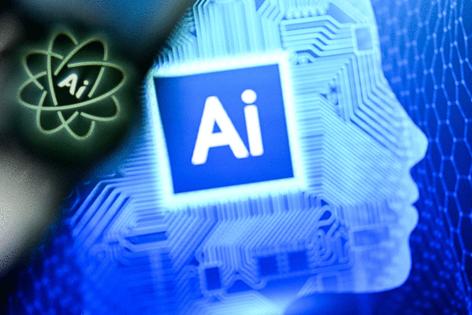Editorial: Ethical dilemmas of AI need illumination
Published in Op Eds
It is the stuff of science fiction: artificial intelligence mimicking human thought.
Is that a good thing or a bad thing? Does it portend a future where workers are free of the most mundane tasks, or an era of massive unemployment where even poetry, music and art is churned out of data centers?
When it comes to AI, parameters of the debate are hard to define. There is much at stake.
As such, it is worthwhile to review a reflection published by Pope Francis last month titled: "Note on the Relationship Between Artificial Intelligence and Human Intelligence."
Among the observations:
—" ... as AI models become increasingly capable of independent learning, the ability to maintain control over them to ensure that such applications serve human purposes may effectively diminish. This raises the critical question of how to ensure that AI systems are ordered for the good of people and not against them."
—"AI is currently eliminating the need for some jobs that were once performed by humans. If AI is used to replace human workers rather than complement them, there is a 'substantial risk of disproportionate benefit for the few at the price of the impoverishment of many.'"
—"Individual users, families, civil society, corporations, institutions, governments, and international organizations should work at their proper levels to ensure that AI is used for the good of all."
Executives at Microsoft — which has invested tens of billions of dollars into AI — joined with venture capitalists to create a company blog post on the subject just days before the November election.
"Regulation (of AI) should be implemented only if its benefits outweigh its costs," they wrote.
In a later interview with the editorial board, Microsoft President Brad Smith, one of the blog post authors, clarified that the benefits should accrue to the public, not corporations or the government.
The board asked Smith: Is there debate about what constitutes public benefit?
"Every day and everywhere," Smith replied. "But at least that should define the terms of debate — what will benefit the public."
Three days after his inauguration, President Donald Trump signed an Executive Order "eliminating harmful Biden Administration AI policies and enhancing America's global AI dominance," according to a White House fact sheet.
Trump named venture capitalist David Sacks to be the "White House AI and Crypto Czar."
The fact that the Trump administration lumped AI with cryptocurrency seems an odd pairing. Each has its own legal, moral and ethical questions.
Pope Francis and others have rightly called for extensive deliberations as regulations and policies roll out.
As one sci-fi author put it on social media: "I want AI to do my laundry and dishes so that I can do art and writing, not for AI to do my art and writing so that I can do my laundry and dishes."
That aspiration ought to be a goal of all AI technology yet to come.
_____
© 2025 The Seattle Times. Visit www.seattletimes.com. Distributed by Tribune Content Agency, LLC.




























































Comments